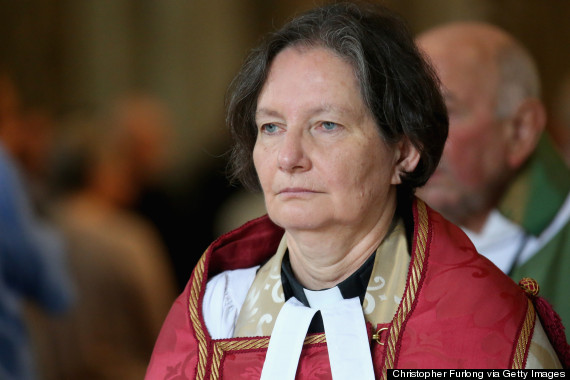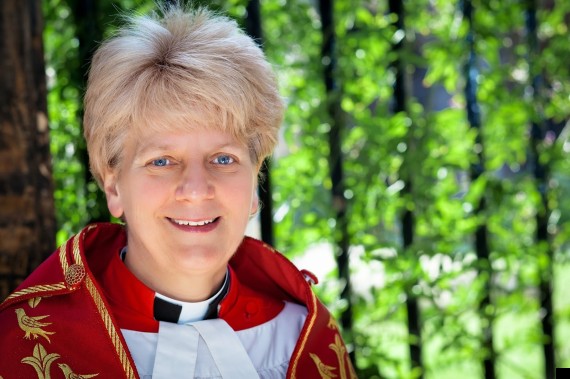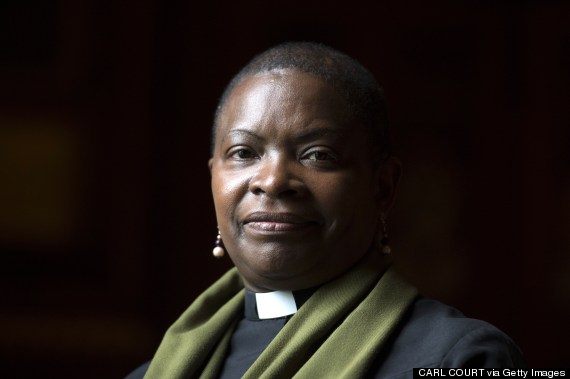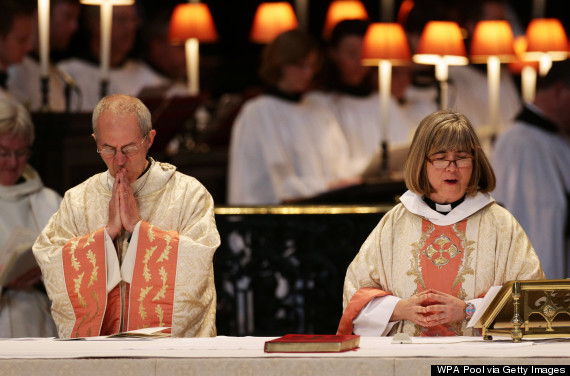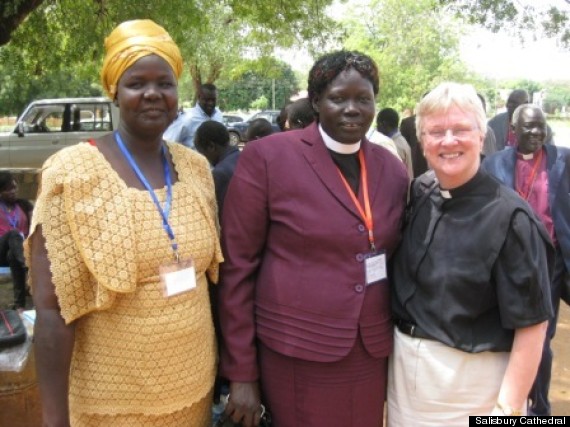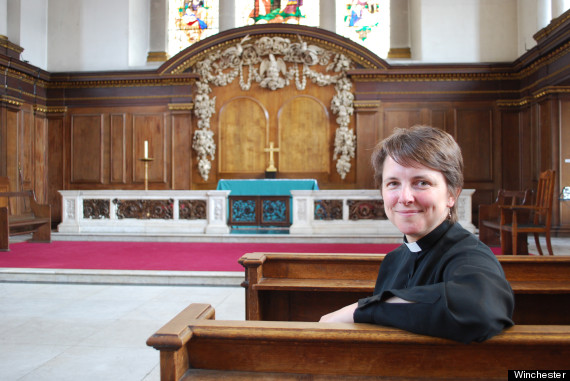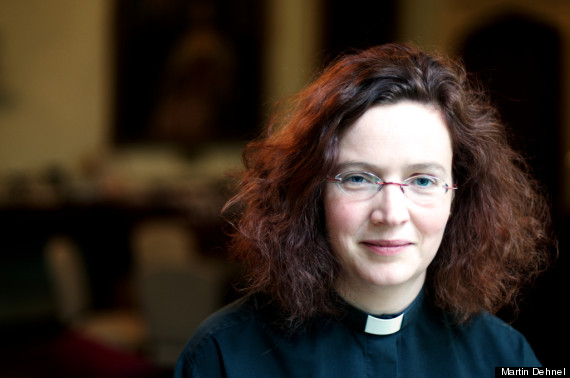A minority opposed to the appointment of women bishops could being subject of "bile, vitriol and disapprobation", the Church of England's General Synod heard today.
The landmark change is expected to finally be given the nod after being scuppered by just six votes in 2012. During the two-hour debate at the University of York, many said they had changed their minds due to the weight of feeling from congregants, and safeguards put in place for any community uncomfortable with a woman leader.
It has been a long time coming. John Sentamu, the archbishop of York, said Synod ought to be getting the hang of this now, to chuckles from the floor, as he opened the debate. He then warned those planning to speak at the debate against "tedious repetition".

Members of the clergy arrive for the General Synod of Church of England meeting at The University of York
But many fear that those who oppose the measure will now be demonised within the church and a schism will emerge. During the debate Prudence Dailey, a member of the house of laity, said it would be "hard for me to forget the amount of bile, vitriol and disapprobation heaped upon the heads of us who voted against".
The key theme was the church's perception by the wider public, something the Archbishop of Canterbury, the Most Rev Justin Welby admitted yesterday, when he told the BBC that the general public would find it "incomprehensible" that women bishops had not yet been introduced by the Church of England.

The Archbishop of Canterbury Justin Welby chats to members of the female clergy before a Eucharist Service at York Minster
The Bishop of Rochester, the Rt Rev James Langstaff, said that it was important the church represented the view of the vast majority of its members. "Wherever each of us stands on the spectrum of views, I want to suggest today that we have a responsibility to be guided, yes, by what we ourselves think, but also by what we assess to be the settled view of the great majority within the Church of England," he said.
That was the feeling of Adrian Vincent, of the house of laity, who said that although he personally opposed women bishops, he would vote in favour because of the strength of feeling among the Church's members.
Others who had changed their minds since 2012 included Thomas Sutcliffe, a member of the house of laity, pointed out that the two countries in the World Cup final, as well as their Brazilian hosts, were governed by women.
"We do believe that we must act on our conviction that the church now needs the special and different gifts of women," he said, adding that the proposal does not demand that their be gender equality in numbers. Female bishops will be "normal and routine … an unremarkable normality" he said.
Julian Henderson, the bishop of Blackburn, said he would now back the proposal "enthusiastically" because of the safeguards put in place since he opposed the measure in 2012.
But many others said their convictions against women bishops remained the same, including John Goddard, the Anglo-Catholic bishop of Burnley, the house of laity's Jane Patterson, a conservative evangelical, and St Peter's Harold Wood vicar David Banting, who said the proposal removes his "unique calling to be a man".
For some, the vote sends a message that women can go to the top of their careers in the church. Emma Ineson, a member of the house of clergy and principal of Trinity College, Bristol said she saw women training to be priests who "could have chosen to do almost anything else with their lives."
Story continues below slideshow
"A clear vote in favour today would send a very clear message to that the church to which they've offered themselves says yes to them, values them, sees their potential," she added.
The new simplified legislation includes a declaration by the Church of England bishops outlining arrangements for parishes who do not accept the authority of a woman bishop. An ombudsman will be appointed to help resolve disputes.
Now 43 out of 44 dioceses - including two which voted against in the past - have backed the legislation overwhelmingly. The 44th diocese, Europe, was unable to complete the consultation in time.
WHO COULD BE THE WOMEN BISHOPS?
The Very Rev Vivienne Faull, 59, Dean of York Minster
Ms Faull is widely believed to be the favourite to be appointed as first woman bishop in the Church of England. She studied at the Queen's School Chester and St Hilda's College, Oxford, and was among the first batch of more than 1,000 women ordained in the Church of England.
A former chaplain to Clare College, Cambridge, Ms Faull was the first woman to hold such an appointment at either Oxford or Cambridge universities. In 2000, she became the first woman appointed to run any English cathedral when she was made provost of Leicester Cathedral. She was named dean of York Minster in 2012, with a staff of 160 and 600 volunteers to coordinate.
When she started as a priest, Ms Faull said it was not unknown for a woman to be forbidden to take funerals because as she once explained: "The local population took the view that if a woman led the funeral service, how would you know that you were properly dead?"
The Very Rev Dr Jane Hedges, 58, Dean of Norwich
Dr Hedges, former Canon Steward of Westminster Abbey and Archdeacon of Westminster, was installed last month as Dean of Norwich. At Westminster Abbey, Dr Hedges had responsibility for welcoming the abbey's millions of visitors and pilgrims every year. She was frequently seen at high-profile services in Westminster Abbey, greeting and accompanying senior members of the Royal Family.
Dr Hedges received widespread coverage when she became the first clergywoman to shake hands with Pope Benedict XVI when he attended a prayer service at Westminster Abbey on his visit to Britain in 2010. She was among the first group of women to be ordained in 1994.
The Rev Rose Hudson-Wilkin, 52, chaplain to the House of Commons, a chaplain to the Queen and vicar in two inner city parishes in Hackney, east London
The first black female chaplain to the House of Commons is known for her forthright manner and once reportedly kept a cricket bat next to the door at her east London vicarage for protection against aggressive late night callers.
Ms Hudson-Wilkin was born and brought up in Montego Bay, Jamaica, before settling in the UK in 1985.She worked in the Midlands before moving to London. She told The Sunday Telegraph in 2012: "I have no ambition to become a bishop. "If there are people sitting around, men and women, dying to be bishops, then they must have very sad lives."
Canon Philippa Boardman, 50, Canon Treasurer of St Paul's Cathedral
Among the first women to be ordained in the Church of England in 1994. Presided over the national service to mark the 20th anniversary of women's ordination in the Church of England in St Paul's earlier this year with the Archbishop of Canterbury, the Most Rev Justin Welby, acting as her deacon. Was made an MBE in 2011 for services to heritage in east London, in recognition of her work to renovate and re-open the Church of St Paul in Old Ford, east London.
She told the Guardian that she was wearing something purple - the colour worn by bishops - every day in a protest at the shock defeat of the women bishops legislation at the General Synod in November 2012.
The Very Rev Dr June Osborne, 61, Dean of Salisbury Cathedral (right)
Dr Osborne was the first woman to be made a dean of one of the Church of England's medieval cathedrals when she was appointed at Salisbury Cathedral in 2004. A graduate in social sciences from Manchester University and married to a QC, Dr Osborne worked as a deacon in the Church of England for 12 years before being ordained in 1994 among the first batch of women priests in the Church of England.
The Rev Lucy Winkett, Rector of James's Piccadilly, central London
A former professional singer, Ms Winkett has degrees in history and theology and has also studied at the Royal College of Music. She served her curacy in Ilford, east London, before being made canon precentor at St Paul's Cathedral. She is an author and a regular contributor to BBC Radio 4's Thought For The Day slot.In
When her appointment at St Paul's was announced in February 1997, it was criticised by the cathedral's chancellor John Halliburton, who was against the ordination of women priests. He said he did not regard Winkett as a priest and would not take communion with her. She was also reportedly spat at by members of the clergy at St Pauls.
Dr Miranda Threlfall-Holmes, 40, vicar of Belmont and Pittington, Durham
Dr Threlfall Holmes, a historian, is a prominent campaigner for women bishops. She was a university chaplain and research fellow at University College, Durham, and was interim principal of Durham University's Ustinov College.
An avid user of social media, Dr Threlfall-Holmes compared the Church of England to an abusive husband on her blog in 2012 following controversial last-minute changes to the draft legislation introducing women bishops.
She later withdrew the posting. She is said to be a former atheist who became a Christian while at Cambridge University.

